How to analyze JDBC programming in MySQL
1. Necessary conditions for database programming
Programming languages, such as Java, C, C, Python and other databases, such as Oracle, MySQL, SQL Server and other database driver packages: different databases correspond to different Programming languages provide different database driver packages. For example, MySQL provides the Java driver package mysql-connector-java. This driver package is required to operate MySQL based on Java. If you want to use Java to operate the Oracle database, you must use Oracle's database driver package ojdbc.
2. Java database programming: JDBC
Java Database Connectivity, referred to as JDBC, is a Java API used to connect to a database. Java API is used to execute SQL statements, which is a database connection specification in Java. This API consists of some classes and interfaces in the java.sql.*, javax.sql.* packages. It provides a standard API for Java developers to operate databases and can provide unified access to multiple relational databases.
3. Working Principle of JDBC
DBC provides a unified access method for a variety of relational databases. As a high-level abstraction for a specific manufacturer's database access API, it mainly includes some common interface classes.
JDBC access database hierarchy:
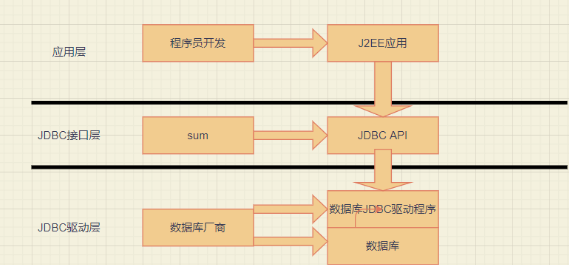
4. Development environment setup
First check your MySQL version in the computer service, and then Enter the maven repository

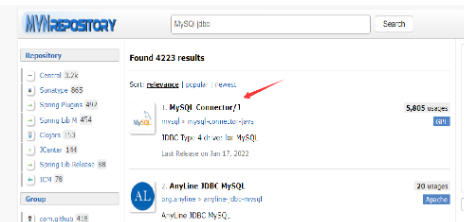
Because my own version is after 5.0, I chose 5.1.47, and the major versions must be consistent

Just download the jar. Remember, the jar package cannot be decompressed.
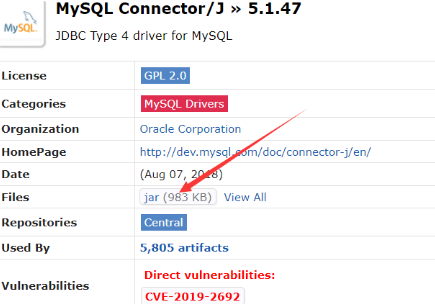
The next step is to put the idea in the root directory. Create a folder under and then import the jar package
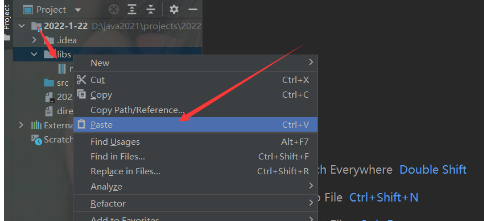
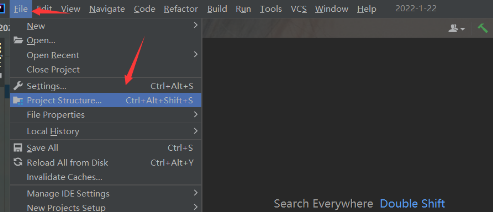
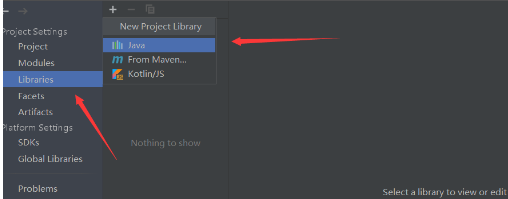
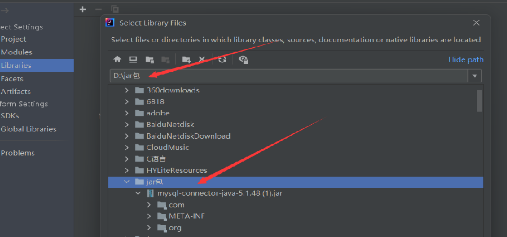
// 加载JDBC驱动程序:反射,这样调用初始化com.mysql.jdbc.Driver类,即将该类加载到JVM方法
区,并执行该类的静态方法块、静态属性。
Class.forName("com.mysql.jdbc.Driver");
// 创建数据库连接
Connection connection =
DriverManager.getConnection("jdbc:mysql://localhost:3306/test?
user=root&password=root&useUnicode=true&characterEncoding=UTF-8");//MySQL数据连接的URL参数格式如下: jdbc:mysql://服务器地址:端口/数据库名?参数名=参数值
Statement statement = connection.createStatement();
ResultSet resultSet= statement.executeQuery(
"select id, sn, name, qq_mail, classes_id from student");while (resultSet.next()) {
int id = resultSet.getInt("id");
String sn = resultSet.getString("sn");
String name = resultSet.getString("name");
int classesId = resultSet.getInt("classes_id");
System.out.println(String.format("Student: id=%d, sn=%s, name=%s,
classesId=%s", id, sn, name, classesId));
}//关闭结果集
if (resultSet != null) {
try {
resultSet.close();
} catch (SQLException e) {
e.printStackTrace();
}
}
//关闭命令
if (statement != null) {
try {
statement.close();
} catch (SQLException e) {
e.printStackTrace();
}
}
//关闭连接命令
if (connection != null) {
try {
connection.close();
} catch (SQLException e) {
e.printStackTrace();
}
}create database java122;
create table text(id int,name varchar(5),class_id int);
import com.mysql.jdbc.jdbc2.optional.MysqlDataSource;
import javax.sql.DataSource;
import java.sql.Connection;
import java.sql.PreparedStatement;
import java.sql.SQLException;
public class TextJDBC {
//DataSource
//Connection
//PrepareStatement
public static void main(String[] args) throws SQLException{
//1、创建DataSource对象
DataSource dataSource = new MysqlDataSource();
//设置相关内容
//URL User password
//向下转型 访问数据库 协议名 ip地址 要访问那个地址
((MysqlDataSource) dataSource).setURL("jdbc:mysql://127.0.0.1:3306/java122?characterEncoding=utf-8&useSSL=false");
((MysqlDataSource) dataSource).setUser("root");
((MysqlDataSource) dataSource).setPassword("180210");
//2、和数据库连接.进行后续连接
//connect生命周期较短
Connection connection = dataSource.getConnection();
//3、拼装SQL语句
int id = 1;
String name = "曹操";
int class_id = 10;
//?是一个占位符,可以把一个具体的变量的值替换到?
String sql = "insert into text values(?,?,?)";
PreparedStatement statement = connection.prepareStatement(sql);
//1 2 3相当与?的下标
statement.setInt(1,id);
statement.setString(2,name);
statement.setInt(3,class_id);
System.out.println("statement:" + statement);
//4、执行SQL语句
int ret = statement.executeUpdate();
System.out.println("ret:" + ret);
//5、关闭相关资源
//后创建的先释放,顺序不能错
statement.close();
connection.close();
}
}
import com.mysql.jdbc.jdbc2.optional.MysqlDataSource;
import javax.sql.DataSource;
import javax.xml.transform.Source;
import java.sql.Connection;
import java.sql.PreparedStatement;
import java.sql.ResultSet;
import java.sql.SQLException;
import java.util.Scanner;
public class Text1 {
public static void main(String[] args) throws SQLException {
//1,创建实列
DataSource dataSource = new MysqlDataSource();
((MysqlDataSource)dataSource).setURL("jdbc:mysql://127.0.0.1:3306/java122?characterEncoding=utf-8&useSSL=false");
((MysqlDataSource)dataSource).setUser("root");
((MysqlDataSource)dataSource).setPassword("180210");
//2,数据库连接
Connection connection = dataSource.getConnection();
//3,构造SQL语句
String sql ="select * from text";
PreparedStatement statement = connection.prepareStatement(sql);
//4,执行SQL语句
ResultSet resultSet = statement.executeQuery();
while (resultSet.next()){
int id = resultSet.getInt("id");
String name = resultSet.getString("name");
int class_id = resultSet.getInt("class_id");
System.out.println("id: " + id + "name: " + name + "class_id: " + class_id);
}
//5,关闭相关资源
resultSet.close();
statement.close();
connection.close();
}
}Copy after login
import com.mysql.jdbc.jdbc2.optional.MysqlDataSource;
import javax.sql.DataSource;
import javax.xml.transform.Source;
import java.sql.Connection;
import java.sql.PreparedStatement;
import java.sql.ResultSet;
import java.sql.SQLException;
import java.util.Scanner;
public class Text1 {
public static void main(String[] args) throws SQLException {
//1,创建实列
DataSource dataSource = new MysqlDataSource();
((MysqlDataSource)dataSource).setURL("jdbc:mysql://127.0.0.1:3306/java122?characterEncoding=utf-8&useSSL=false");
((MysqlDataSource)dataSource).setUser("root");
((MysqlDataSource)dataSource).setPassword("180210");
//2,数据库连接
Connection connection = dataSource.getConnection();
//3,构造SQL语句
String sql ="select * from text";
PreparedStatement statement = connection.prepareStatement(sql);
//4,执行SQL语句
ResultSet resultSet = statement.executeQuery();
while (resultSet.next()){
int id = resultSet.getInt("id");
String name = resultSet.getString("name");
int class_id = resultSet.getInt("class_id");
System.out.println("id: " + id + "name: " + name + "class_id: " + class_id);
}
//5,关闭相关资源
resultSet.close();
statement.close();
connection.close();
}
}
import com.mysql.jdbc.jdbc2.optional.MysqlDataSource;
import javax.sql.DataSource;
import java.sql.Connection;
import java.sql.PreparedStatement;
import java.sql.SQLException;
import java.util.Scanner;
public class Textur2 {
public static void main(String[] args) throws SQLException {
Scanner scanner = new Scanner(System.in);
System.out.println("请输入要删除学生的姓名:");
String name = scanner.next();
//1,创建实列
DataSource dataSource = new MysqlDataSource();
((MysqlDataSource) dataSource).setURL("jdbc:mysql://127.0.0.1:3306/java122?characterEncoding=utf-8&useSSL=false");
((MysqlDataSource) dataSource).setUser("root");
((MysqlDataSource) dataSource).setPassword("180210");
//2,数据库连接
Connection connection = dataSource.getConnection();
//3,构造SQL语句
String sql = "delete from text where name = ?";
PreparedStatement statement = connection.prepareStatement(sql);
statement.setString(1,name);
//4,执行SQL
int ret = statement.executeUpdate();
if (ret == 1){
System.out.println("删除成功");
}else {
System.out.println("删除失败");
}
//5,关闭资源
statement.close();
connection.close();
}
}Copy after login
import com.mysql.jdbc.jdbc2.optional.MysqlDataSource;
import javax.sql.DataSource;
import java.sql.Connection;
import java.sql.PreparedStatement;
import java.sql.SQLException;
import java.util.Scanner;
public class Textur2 {
public static void main(String[] args) throws SQLException {
Scanner scanner = new Scanner(System.in);
System.out.println("请输入要删除学生的姓名:");
String name = scanner.next();
//1,创建实列
DataSource dataSource = new MysqlDataSource();
((MysqlDataSource) dataSource).setURL("jdbc:mysql://127.0.0.1:3306/java122?characterEncoding=utf-8&useSSL=false");
((MysqlDataSource) dataSource).setUser("root");
((MysqlDataSource) dataSource).setPassword("180210");
//2,数据库连接
Connection connection = dataSource.getConnection();
//3,构造SQL语句
String sql = "delete from text where name = ?";
PreparedStatement statement = connection.prepareStatement(sql);
statement.setString(1,name);
//4,执行SQL
int ret = statement.executeUpdate();
if (ret == 1){
System.out.println("删除成功");
}else {
System.out.println("删除失败");
}
//5,关闭资源
statement.close();
connection.close();
}
}
 ##5. Modify information
##5. Modify information
import com.mysql.jdbc.jdbc2.optional.MysqlDataSource;
import javax.sql.DataSource;
import java.sql.Connection;
import java.sql.PreparedStatement;
import java.sql.SQLException;
import java.util.Scanner;
public class Text4 {
public static void main(String[] args) throws SQLException {
//修改信息
Scanner scanner = new Scanner(System.in);
System.out.println("请输入学生的id:");
int id = scanner.nextInt();
System.out.println("请输入修改学生姓名:");
String name = scanner.next();
//1,创建实列
DataSource dataSource = new MysqlDataSource();
((MysqlDataSource) dataSource).setURL("jdbc:mysql://127.0.0.1:3306/java122?characterEncoding=utf-8&useSSL=false");
((MysqlDataSource) dataSource).setUser("root");
((MysqlDataSource) dataSource).setPassword("180210");
//2,数据库连接
Connection connection = dataSource.getConnection();
//3,拼装SQL
String sql = "update text set name = ? where id = ?";
PreparedStatement statement = connection.prepareStatement(sql);
statement.setString(1,name);
statement.setInt(2,id);
//4,执行SQL
int set = statement.executeUpdate();
if (set == 1){
System.out.println("修改成功");
}else {
System.out.println("修改失败");
}
//5,关闭资源
statement.close();
connection.close();
}
}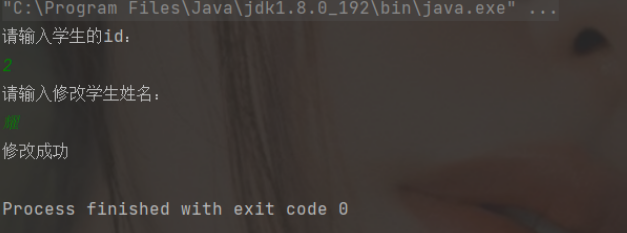
The above is the detailed content of How to analyze JDBC programming in MySQL. For more information, please follow other related articles on the PHP Chinese website!

Hot AI Tools

Undresser.AI Undress
AI-powered app for creating realistic nude photos

AI Clothes Remover
Online AI tool for removing clothes from photos.

Undress AI Tool
Undress images for free

Clothoff.io
AI clothes remover

AI Hentai Generator
Generate AI Hentai for free.

Hot Article

Hot Tools

Notepad++7.3.1
Easy-to-use and free code editor

SublimeText3 Chinese version
Chinese version, very easy to use

Zend Studio 13.0.1
Powerful PHP integrated development environment

Dreamweaver CS6
Visual web development tools

SublimeText3 Mac version
God-level code editing software (SublimeText3)

Hot Topics
 1378
1378
 52
52
 MySQL: Simple Concepts for Easy Learning
Apr 10, 2025 am 09:29 AM
MySQL: Simple Concepts for Easy Learning
Apr 10, 2025 am 09:29 AM
MySQL is an open source relational database management system. 1) Create database and tables: Use the CREATEDATABASE and CREATETABLE commands. 2) Basic operations: INSERT, UPDATE, DELETE and SELECT. 3) Advanced operations: JOIN, subquery and transaction processing. 4) Debugging skills: Check syntax, data type and permissions. 5) Optimization suggestions: Use indexes, avoid SELECT* and use transactions.
 How to open phpmyadmin
Apr 10, 2025 pm 10:51 PM
How to open phpmyadmin
Apr 10, 2025 pm 10:51 PM
You can open phpMyAdmin through the following steps: 1. Log in to the website control panel; 2. Find and click the phpMyAdmin icon; 3. Enter MySQL credentials; 4. Click "Login".
 How to create navicat premium
Apr 09, 2025 am 07:09 AM
How to create navicat premium
Apr 09, 2025 am 07:09 AM
Create a database using Navicat Premium: Connect to the database server and enter the connection parameters. Right-click on the server and select Create Database. Enter the name of the new database and the specified character set and collation. Connect to the new database and create the table in the Object Browser. Right-click on the table and select Insert Data to insert the data.
 How to create a new connection to mysql in navicat
Apr 09, 2025 am 07:21 AM
How to create a new connection to mysql in navicat
Apr 09, 2025 am 07:21 AM
You can create a new MySQL connection in Navicat by following the steps: Open the application and select New Connection (Ctrl N). Select "MySQL" as the connection type. Enter the hostname/IP address, port, username, and password. (Optional) Configure advanced options. Save the connection and enter the connection name.
 MySQL and SQL: Essential Skills for Developers
Apr 10, 2025 am 09:30 AM
MySQL and SQL: Essential Skills for Developers
Apr 10, 2025 am 09:30 AM
MySQL and SQL are essential skills for developers. 1.MySQL is an open source relational database management system, and SQL is the standard language used to manage and operate databases. 2.MySQL supports multiple storage engines through efficient data storage and retrieval functions, and SQL completes complex data operations through simple statements. 3. Examples of usage include basic queries and advanced queries, such as filtering and sorting by condition. 4. Common errors include syntax errors and performance issues, which can be optimized by checking SQL statements and using EXPLAIN commands. 5. Performance optimization techniques include using indexes, avoiding full table scanning, optimizing JOIN operations and improving code readability.
 MySQL: An Introduction to the World's Most Popular Database
Apr 12, 2025 am 12:18 AM
MySQL: An Introduction to the World's Most Popular Database
Apr 12, 2025 am 12:18 AM
MySQL is an open source relational database management system, mainly used to store and retrieve data quickly and reliably. Its working principle includes client requests, query resolution, execution of queries and return results. Examples of usage include creating tables, inserting and querying data, and advanced features such as JOIN operations. Common errors involve SQL syntax, data types, and permissions, and optimization suggestions include the use of indexes, optimized queries, and partitioning of tables.
 How to use single threaded redis
Apr 10, 2025 pm 07:12 PM
How to use single threaded redis
Apr 10, 2025 pm 07:12 PM
Redis uses a single threaded architecture to provide high performance, simplicity, and consistency. It utilizes I/O multiplexing, event loops, non-blocking I/O, and shared memory to improve concurrency, but with limitations of concurrency limitations, single point of failure, and unsuitable for write-intensive workloads.
 How to recover data after SQL deletes rows
Apr 09, 2025 pm 12:21 PM
How to recover data after SQL deletes rows
Apr 09, 2025 pm 12:21 PM
Recovering deleted rows directly from the database is usually impossible unless there is a backup or transaction rollback mechanism. Key point: Transaction rollback: Execute ROLLBACK before the transaction is committed to recover data. Backup: Regular backup of the database can be used to quickly restore data. Database snapshot: You can create a read-only copy of the database and restore the data after the data is deleted accidentally. Use DELETE statement with caution: Check the conditions carefully to avoid accidentally deleting data. Use the WHERE clause: explicitly specify the data to be deleted. Use the test environment: Test before performing a DELETE operation.





